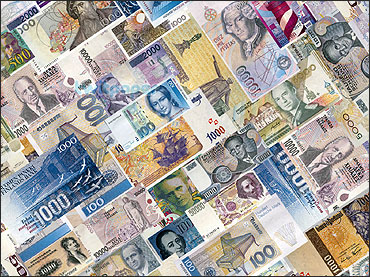Photographs: Jayanta Dey/Reuters N Sundaresha Subramanian & Ashok Divase in Mumbai
The emerging weakness of the local currency against the greenback is beginning to hurt foreign investors.
The rupee's weakness has a cascading effect on equity returns of investors who buy stocks with their dollars.
In the absence of full convertibility, foreign investors have to convert their dollars into rupees to buy stocks here and do the reverse while selling.
Due to the falling rupee, which has lost around five per cent since the RBI raised rates in July, investors get fewer dollars for their rupees.
That shaves off more from their already depleted equity portfolios.
The rupee, which had been stable or gaining marginally during the first half of the year, has begun to decline steadily since the RBI move.
Click on NEXT for more...
Falling rupee begins to hurt dollar investors
Foreign institutional investors have seen their investments lose more than the benchmark due to currency vagaries.
A BS Research Bureau study shows while local investors have seen the benchmark BSE Sensex fall 14.4 per cent, dollar investors have lost 18.07 per cent.
Similarly, on the Nifty, dollar investors lost 18.47 per cent against the 14.84 per cent loss seen by local investors.
The rupee has been the worst performer among Asian currencies, losing 4.46 per cent during this period.
The Korean won has lost 2.84 per cent. Most other Asian currencies have lost around 1 per cent. China's renminbi and the Japanese yen have gained 0.84 per cent and 1.59 per cent, respectively.
Click on NEXT for more...
Falling rupee begins to hurt dollar investors
Outflows by foreign investors and the depreciating rupee form a vicious circle. FIIs have sold stocks in the excess of Rs 8,350 crore in this period.
As foreign investors sell rupees and buy dollars, the rupee supply increases and prices fall. An end to outflows or the return of inward flows can break this cycle, say experts.
"When the rupee was around the 44 level, there was an expectation the RBI would not intervene and it could go up to the 42 level.
However, sustained outflows have put pressure and we have seen it reverse.
We have to see if this is a fundamental directional change or a technical pullback," said Sandeep Singal, co-head institutional equities, Emkay Global Financial Services.
...
Falling rupee begins to hurt dollar investors
Phani Sekhar, fund manager, Angel Broking, said investors were not in a position to worry about currency differences as they were more worried about risk.
"In a steady market state, people will be looking at currency fluctuations. But, foreign investors are selling because of risk aversion.
When investors are driven by risk aversion, a few percentage points either way on the currency do not make much difference," Sekhar said.
Click on NEXT for more...
Falling rupee begins to hurt dollar investors
Image: The Bombay Stock Exchange.Experts feel further portfolio outflows are unlikely unless there is a major event globally. "Some time back, there was a two percentage point differential between the yields in bond and equity markets.
When bond yields were around 8 per cent, equity markets were trading around 16 times the earnings, translating into a yield of nearly six per cent.
Now that it has come down to 12 times, the gap in yields has closed. The fundamentals will be dictated by events in Western markets," Singal said.







article